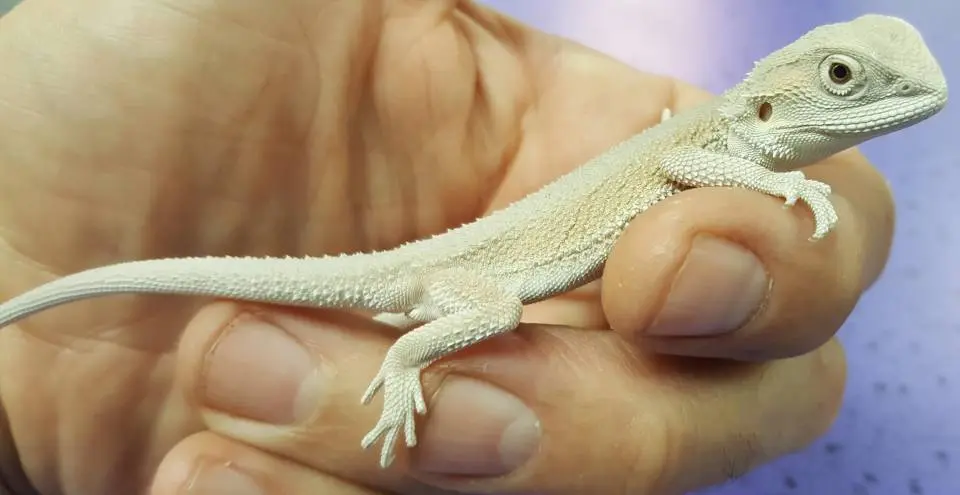Some worry if bearded dragons bite or not, only to find out that getting into the world of reptile companionship often leads to more fascinating questions about their behavior and interactions.
Among the most frequently asked inquiries is the curiosity surrounding the biting tendencies of bearded dragons.
These captivating creatures with fascinating traits and behaviors, have been attracting the attention of scientists, enthusiasts, and pet owners for centuries. Hence, the desire to get to know more about them.
What’s Up With Bearded Dragons?
Bearded Dragons are found in the dry, rock-strewn, semi-desert ecosystems of Australia, where survival of the fittest is the order of the day. They’re omnivorous by nature, thriving on a perfectly balanced mix of vegetables, fruits, and insects.
Bearded Dragons are well-known for their docile nature and ease of grooming, making them a favorite in the exotic pet trade. At first glance, their edgy exterior might seem intimidating.
However, they’re generally peaceful, friendly creatures with calm behavior.
Do Bearded Dragons Bite?
Shifting the focus to our main concern, despite their somewhat intimidating appearance, Bearded Dragons are not aggressive biters.
As opposed to many misconceptions, the act of biting is typically irregular behavior linked to specific triggers rather than a habitual action.
While there’s always a risk of coming across a Bearded Dragon with an unusual temperament, most are quite friendly.
What Triggers a Bearded Dragon to Bite?
Now that I’ve proved that Bearded Dragons do indeed bite, the next step for me is to break down what triggers this behavior.
1. Communication
In the absence of spoken words, biting is a form of communication for Bearded Dragons. It’s their unique way of ventilating discomfort, fear, or distress.
It might seem odd to us, but in their world, biting could just be saying, “Hey, that’s enough cuddles for the day, I need my solitude.”
2. Self-Defense Mechanism
Similar to all living creatures, Bearded Dragons have an inherent survival instinct that comes into play under perceived threats.
Any unexpected actions, rough handling, or new environments can trigger an element of fear.
In such cases, biting becomes more of a defense mechanism than an act of aggression.
3. Starvation or Mistaken Identity
A hungry Bearded Dragon could inadvertently bite while attempting to gobble up a hearty meal. If the handler’s fingers come precariously close to the food (especially live insects), they might become collateral damage.
These instances are accidents rather than conscious acts of biting.
The Impact of a Bearded Dragon’s Bite
The aftermath of a Bearded Dragon’s bite is a subjective matter. It largely trickles down to two factors – the size of the Dragon in question and the recipient’s threshold for pain.
Even though they have sharp teeth designed for their omnivorous diet, Bearded Dragons do not have venom or harmful bacteria in their bite that can lead to substantial damage.
The most you can expect from a bite is mild to moderate discomfort and some level of temporary pain. It’s relatively harmless but requires immediate cleaning to prevent any infection.
How To Prevent Bearded Dragons Bite
Now that we’re aware of the “why” behind their biting, let’s explore the different ways we can prevent our beloved Bearded Dragons from biting.
1. Handling 101
Gradual adjustment to being handled can significantly reduce biting incidents. While doing this, always remember to approach from the side.
Approaching from the top creates a predator-like shadow and could lead to adverse reactions, bites included.
2. Habitual Feeding Tools
Feeding can turn into a battlefield if not handled appropriately. Employ feeding tools when dealing with live or juicy foods to avoid any accidental nips.
Consistent feeding times and places can also train the Dragon to exhibit less aggressive responses during meals.
3. Behavioral Awareness
Recognizing certain behavioral signs can go a long way in avoiding unwanted bites.
If your bearded dragon’s beard darkens, its body puffs up, or it showcases aggressive postures, it could be a sign of discomfort leading to a potential bite.
4. Habitat Hygiene
Creating and maintaining biologically appropriate surroundings helps create a stress-free environment for Bearded Dragons.
The right enclosure size, accurate temperatures, and sufficient hiding spots replicate the natural habitats and reduce stress-based biting behaviors.
Wrapping Up
YES, bearded dragons do bite and are no mindless biters. They bite only to communicate certain emotions or feelings that they’re unable to express otherwise.
Understanding these ‘coded messages’ is the cornerstone to a hassle-free experience with your bearded pet.
Remember, every possible number of bites is dwarfed by the countless moments of calmness they bring into your lives. And with this article shining a light on biting behavior, I hope to make that journey a bit more comfortable for you and your Bearded Dragon.
